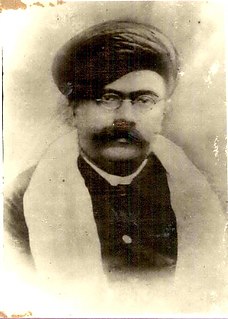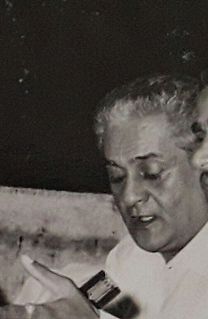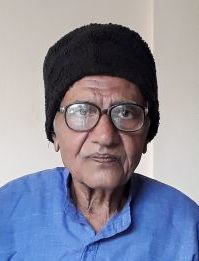Related Research Articles

Manishankar Ratnji Bhatt, popularly known as Kavi Kant was a Gujarati poet, playwright and essayist. He is an innovator of Khandkavya, a typical Gujarati poetic form and narration of one episode. His book Purvalap (1923) is a landmark in Gujarati poetry.

Gijubhai Badheka was an educator who helped to introduce Montessori education methods to India. He is referred to as "Moochhali Maa". Badheka was a high court lawyer, however, following the birth of his son in 1923, he developed an interest in childhood development and education. In 1920, Badheka founded the "Bal Mandir" pre-primary school. Badheka published a number of works in the field of education including Divaswapna ("Daydreams").
Nanabhai Bhatt, born Nrusinhprasad Kalidas Bhatt, was an Indian educator, writer, thinker and Indian independence activist. Bhatt was a contemporary of educators Gijubhai Badheka and Harbhai Trivedi. The three worked to advance rural education. Bhatt died on 31 December 1961.

Manubhai Pancholi also known by his pen name Darshak, was a Gujarati language novelist, author, educationist and politician from Gujarat, India. He participated in the Indian independence movement and held several offices after independence.

Kamlashankar Pranshankar Trivedi was Gujarati language editor and grammarian.
Anwar Mohammadbhai Agewan was a Gujarati biographer, folklorist and editor from India. Born in Akola and educated in Gujarat and Bombay, he edited several publications. He wrote on religious thought and various saints of Gujarat.
Kanti Bhatt was an Indian author, journalist and columnist who is estimated to have written more than 45,000 columns in several Gujarati publications. Bhatt became a journalist in 1966 and served as the subeditor of Vyapar in 1967. He later became a freelance journalist and wrote columns for several Gujarati publications including Chitralekha, Mumbai Samachar, Janshakti, Sandesh, Yuva Darshan and Jansatta. He worked in Kenya for some time in 1977. He was an investigative journalist and also wrote daily columns titled Aaspaas and Chetnani Kshane in Divya Bhaskar.

Barkat Ali Ghulam Hussain Virani, known by his pen name Befām, was Gujarati author and poet especially known for his ghazals.

Ramnarayan Vishwanath Pathak was a Gujarati poet and writer from India. Profoundly influenced by Gandhian thought, Pathak wrote criticism, poetry, drama, metrics and short stories. He edited and translated literary works. He was appointed the president of Gujarati Sahitya Parishad in 1946. He was awarded the Gujarati literary prizes Narmad Suvarna Chandrak for Prachin Gujarati Chhando in 1949 and Sahitya Akademi Award for Bruhat Pingal in 1956.

The Gujarat Sahitya Akademi or Gujarat Sahitya Academy, established in 1981, is a government institution dedicated to the development of the languages spoken in Gujarat, India and their literature. Gujarati, an official language of Gujarat, is one of them; the others are Hindi, Sanskrit, Kutchi, Sindhi and Urdu. As of 2017, Vishnu Pandya is the chairman of the Akademi.

Yoseph Macwan is a Gujarati poet and critic from Gujarat, India. He is also well known for his contribution in Gujarati children's literature.
Jaya Vallabhdas Mehta is a Gujarati poet, critic and translator from Gujarat, India. She was educated and later worked at SNDT Women's University.

Harikrishna Pathak is a Gujarati poet, short story writer, editor and children's writer from Gujarat, India.
Yashwant Trivedi is a Gujarati poet, essayist and critic from Gujarat, India.
Prahlad Jethalal Parekh was a Gujarati poet and translator from India whose works contributed to the rise of a modern poetry in the Gujarati literature.
Ravindra Parekh is a Gujarati short story writer, novelist, playwright, poet, critic and translator from Gujarat, India.
Mulshankar Harinand Mulani was a Gujarati playwright from the Gujarati theatre of India. After working as a village development officer and as an editor with a weekly newspaper, he joined the Mumbai Gujarati Natak Mandali, a theatre company, where he worked as a playwright for decades. He wrote more than fifty plays on social, mythological and historical subjects including commercially or critically successful plays like Rajbeej (1891), Ajabkumari, Saubhagya Sundari (1901), Nandbatrisi (1906) and Krishnacharitra (1906).
Navalram Jagnnath Trivedi (1895–1944) was a Gujarati writer, critic and editor. He served as a secretary of Gujarat Sahitya Sabha for twenty years.

Ratilal Mohanlal Borisagar is a Gujarati humourist, essayist and editor from Gujarat, India. Born and educated in Savarkundla, he received a PhD in 1989. After working for some years as a teacher, he joined the state school textbook board until his retirement in 1998. He started his writing career as a story writer, but eventually gained acclaim as a humourist. He published several humour collections and humour novels, including the acclaimed book Enjoygraphy. He edited several works of children's literature and humour literature. In 2019, he received the Sahitya Akademi Award for his essay collection, Mojma Revu Re.
Vishwanath Maganlal Bhatt was a Gujarati literary critic and lexicographer from Gujarat, India. He had published 22 works. He was awarded the Ranjitram Suvarna Chandrak in 1935.
References
- 1 2 3 4 5 "મૂળશંકર મો. ભટ્ટ". Gujarati Sahitya Parishad (in Gujarati). Retrieved 15 November 2016.
- ↑ Peter Hunt (2 September 2003). International Companion Encyclopedia of Children's Literature. Routledge. p. 802. ISBN 978-1-134-87993-9.
- 1 2 3 4 5 Dave, Harish (19 July 2006). "Posts from July 2006 on ગુજરાતી પ્રતિભા પરિચય". ગુજરાતી પ્રતિભા પરિચય (in Gujarati). Retrieved 15 November 2016.
- 1 2 Shastri, Parth (1 November 2014). "Mulshankar Bhatt made learning a joy for kids". The Times of India. Retrieved 15 November 2016.
- ↑ Jules Verne (18 April 2013). Sahasiko Ni Srushti - Gujarati eBook. R R Sheth & Co Pvt Ltd. p. 179. ISBN 978-93-81336-35-9.
- ↑ Mohan Lal (1992). Encyclopaedia of Indian Literature: Sasay to Zorgot. Sahitya Akademi. p. 4254. ISBN 978-81-260-1221-3.